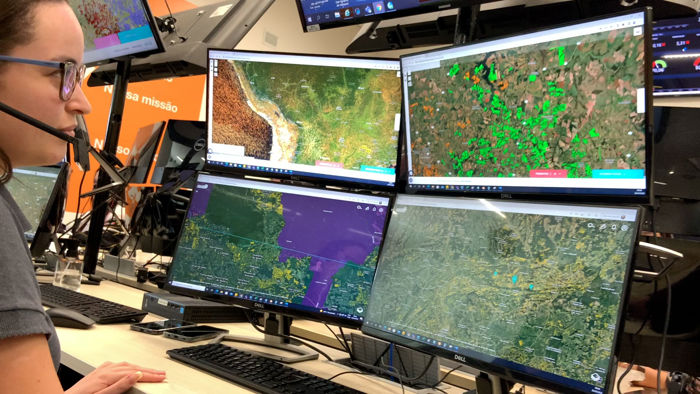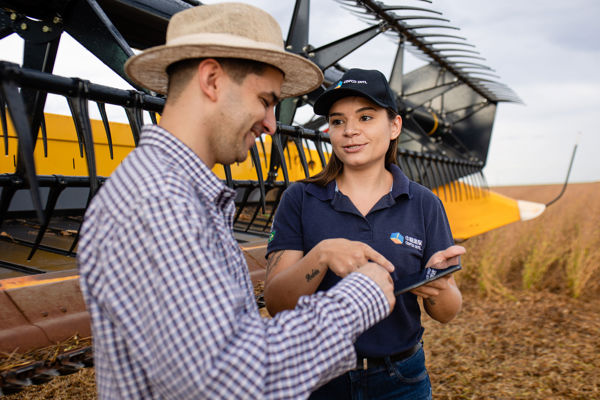
Making progress towards our emissions reductions targets
Climate change is one of the most pressing challenges of our time, demanding urgent and collective action. COFCO International recognises the critical role the agricultural industry plays in shaping a sustainable future for our planet, and is committed to playing its part in global efforts to mitigate the worst impacts.
As part of that work, the company has set targets to reduce emissions that are aligned with the Paris Agreement goal to limit global warming to 1.5°C compared to pre-industrial levels, which were validated by the Science Based Targets initiative (SBTi) earlier this year.
The targets commit the company to reducing Scope 1 and 2 greenhouse gas emissions by 54.6% by 2033; and Scope 3 emissions from purchased goods and services, upstream and downstream transportation and distribution by 32.5% by the same year. These targets include energy use at all COFCO International’s assets, and emissions from its maritime freight business.
COFCO International has also set targets using the Forest, Land and Agriculture (FLAG) guidance for its land-based emissions which cover the company’s plantations in Brazil and South Africa, and its soy and corn sourcing in South America.
First financing linked to FLAG-targets
COFCO International and Singapore-headquartered OCBC announced the first financing facility with interest rate incentives linked to SBTi-approved FLAG guidance targets in December.
The terms of the USD 600 million revolving credit facility link the incentives to COFCO International’s SBTi FLAG soy and corn emissions reduction targets, which are to reduce Scope 3 FLAG emissions by 46% per tonne of soybean and 45% per tonne of corn by 2033.
COFCO International acknowledges that the agri sector has a key role to play in climate change mitigation and driving positive impact. This was one of the company’s drivers for setting its SBTi-validated targets, which are becoming common across the food and agriculture industry.
Setting and achieving sustainability targets is important to customers who are increasingly demanding accountability, as well as being important preparation for compliance in an evolving regulatory environment. Lowering emissions also increases the resilience of agri supply chains overall, contributing to business continuity. Increasingly, validated emissions reduction targets enhance access to public and private financing which is needed for implementing climate strategies.
Strategy to reach the targets
SBTi enables companies and financial institutions worldwide to play their part in combating the climate crisis. Its target-setting framework shows how much and how quickly private sector actors need to reduce their greenhouse gas emissions to prevent the worst effects of climate change. Its FLAG guidance is the world’s first framework enabling companies in land-intensive sectors such as agriculture to set specific targets addressing emissions from land management and land use change.
Since the SBTi validation, COFCO International has been rolling out its strategy to reach the targets, in which a key first step is securing resources for implementation of the necessary measures.
The new loan is a result of this work, and the interest discounts of this newest sustainability-linked loan – as well as those from previous and existing sustainability-linked loans – are used to finance activities including supplier engagement, deforestation monitoring, and encouraging regenerative agriculture and sustainable farm management in the supply chain.
Transparency is an essential element in the process, and COFCO International will also be reporting externally verified Scope 3 emissions in its 2024 Sustainability Report, with some of the funds from the loan being used for data gathering and monitoring tools.
“Reducing emissions across our supply chains and operations is at the heart of our efforts to protect cultivation of the crops we source, reduce risk and ensure access to food” says Helen Song, CFO of COFCO International. “This loan facility reflects broader trends across the industry, with sustainable financing increasingly linked to emissions reduction targets, and agriculture businesses increasingly setting verified targets, taking actions to meet them, and reporting transparently to be held accountable.”
Deforestation-free soybean and corn
This is COFCO International’s third sustainability-linked loan, following a USD 2.3 billion facility announced in 2019 and a USD 1.6 billion sustainability-linked loan announced in 2022. Key performance indicators (KPIs) have focused on soy traceability, environmental and social screening of farmers, and environmental, social and governance (ESG) risk management.
The emissions reductions will come primarily from implementing COFCO International’s global commitment to deforestation-free soybean and corn sourcing in 2025.
All of the company’s direct suppliers of soy in Brazil are mapped, and sustainability, commercial and origination teams are working closely together to complete this data with traceability of indirect suppliers, and to adapt systems to include data on its suppliers of corn, many of which are the same as for soy. This is important for comprehensive monitoring for compliance with its deforestation policy.
In Argentina, traceability and monitoring efforts are well advanced with the VISEC (Vision Sectorial del Gran Chaco Argentino) system having succeeded in generating a high level of collaboration between stakeholders on transparency for the industry. Building on the robust VISEC system, COFCO International’s origination team has conducted its first independently verified measurements of emissions related to soy production, covering some 50,000 hectares farmed by 20 of its largest suppliers from different parts of the country.
Promoting regenerative agriculture practices in the supply chain also contributes to emissions reductions. In COFCO International’s sugar plantations in Brazil, the company rotates planting sugarcane with soybean, improving soil health and reducing emissions by minimising use of synthetic fertilizers. These crop rotation beans are being sold to customers in China and elsewhere demanding certified sustainable commodities. Together with other members of WBCSD’s Soft Commodities Forum, the company is supporting the adoption of sustainable soy production practices and on-farm conservation under the Farmer First Cluster initiative.
COFCO International is committed to balancing sustainability with business growth. The company is reducing emissions, especially through deforestation-free supply chains, while also promoting agricultural production and food security. Balancing these priorities ensures negative environmental impacts are minimized without compromising the productivity and growth needed for healthy business and producing communities.

Traceability and monitoring efforts

